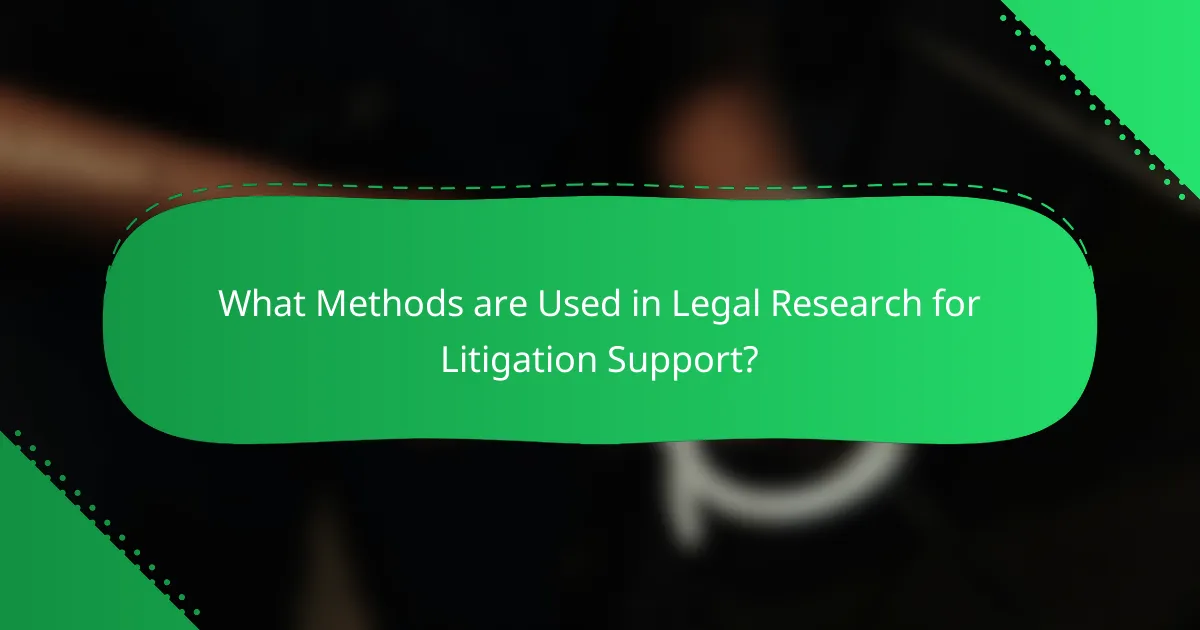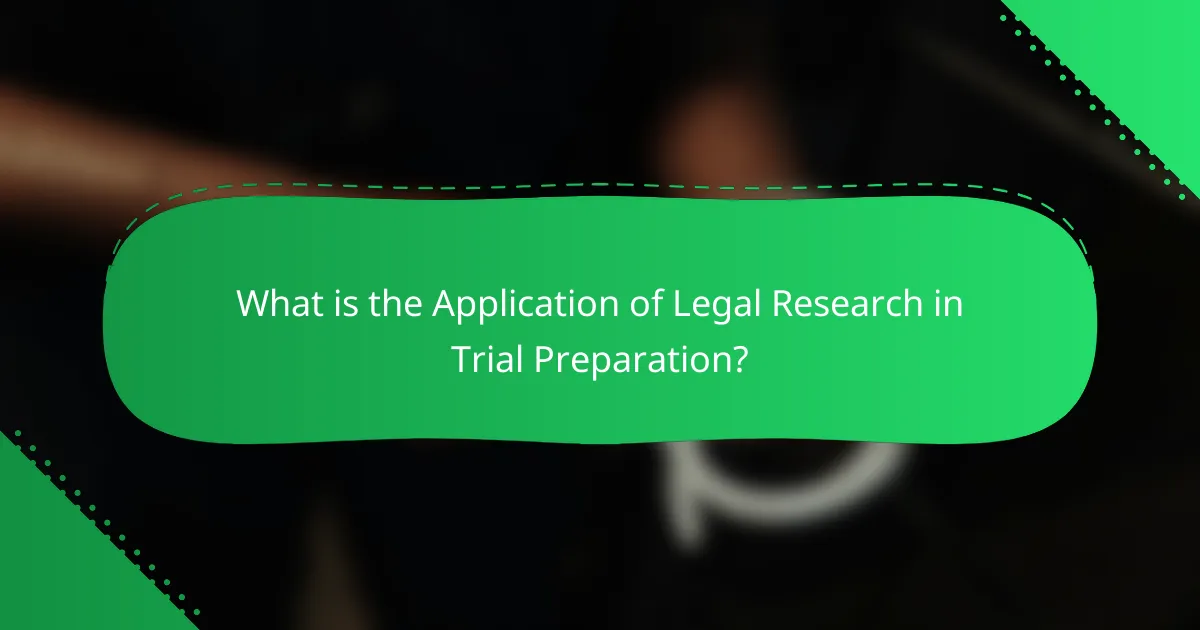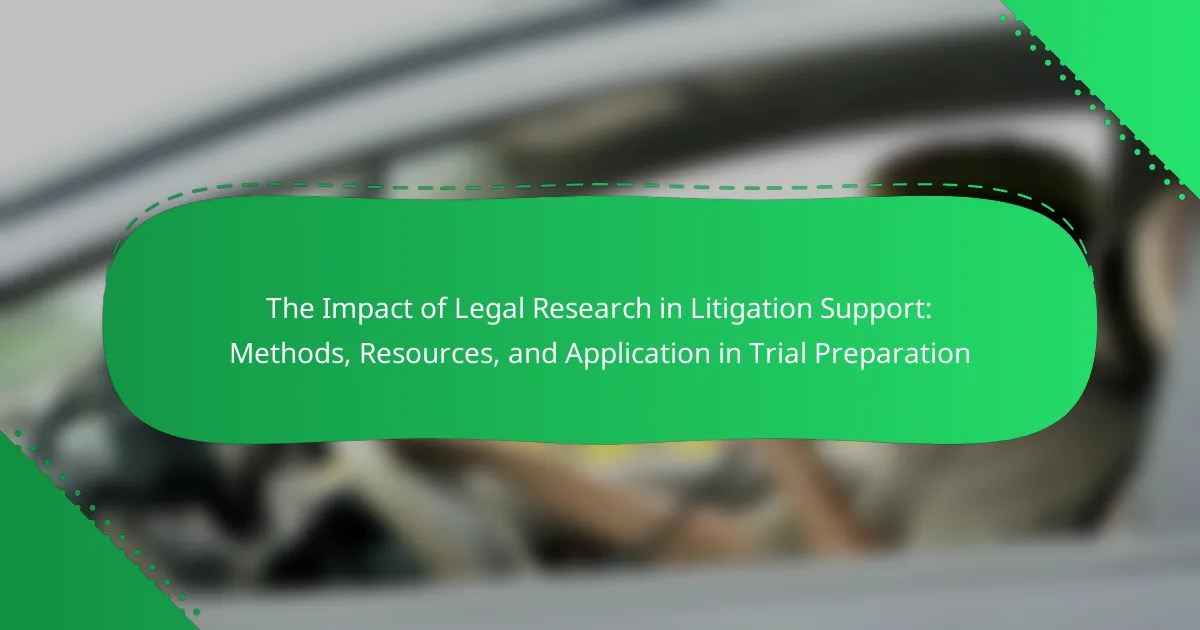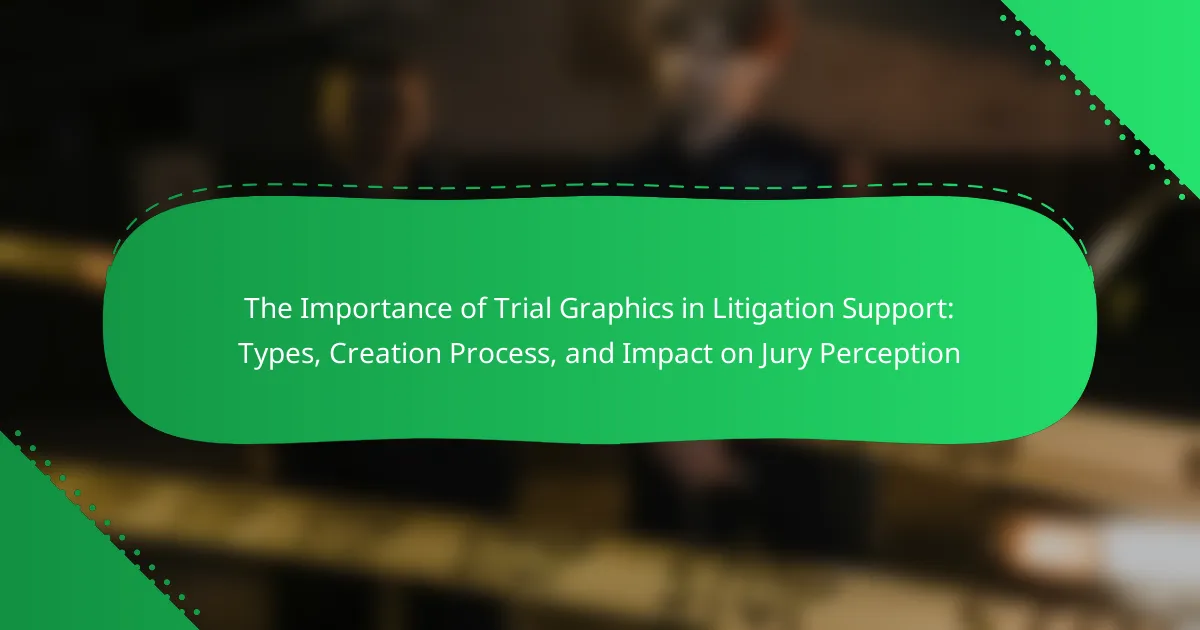Legal research is a critical component of litigation support, providing attorneys with essential information necessary for effective case strategy. It involves methods such as case law analysis, statutory research, and secondary source review, enabling lawyers to identify relevant laws, precedents, and evidence. Key resources include legal databases like Westlaw and LexisNexis, as well as legal treatises and court websites. The application of thorough legal research enhances trial preparation by informing legal arguments, identifying case weaknesses, and supporting the drafting of motions and pleadings, ultimately contributing to improved case outcomes.

What is the Impact of Legal Research in Litigation Support?
Legal research significantly impacts litigation support by providing essential information for case strategy. It helps attorneys identify relevant laws, precedents, and statutes. Accurate legal research informs arguments and strengthens positions in court. Research also aids in uncovering facts and evidence that support a case. A study by the American Bar Association indicates that effective legal research can lead to better case outcomes. Additionally, thorough research can save time and resources during trial preparation. Overall, legal research is a critical component in enhancing the efficacy of litigation support.
How does legal research contribute to effective litigation support?
Legal research contributes to effective litigation support by providing accurate information on laws, precedents, and legal principles. It enables attorneys to build strong cases based on relevant legal frameworks. Comprehensive legal research identifies applicable statutes and case law that support arguments. This process also helps in anticipating opposing counsel’s strategies. Furthermore, legal research aids in drafting precise legal documents and motions. By utilizing reliable legal databases and resources, attorneys can ensure their arguments are well-founded. Studies show that thorough legal research enhances case outcomes and client satisfaction. Effective litigation support relies heavily on the quality and depth of legal research conducted.
What are the key components of legal research in this context?
The key components of legal research in this context include case law analysis, statutory research, and secondary sources. Case law analysis involves reviewing judicial opinions to understand legal precedents. Statutory research focuses on examining relevant statutes and regulations that govern the legal issue at hand. Secondary sources provide commentary and analysis on legal topics, assisting in understanding complex legal principles. These components work together to build a comprehensive legal strategy. Each plays a critical role in preparing for litigation. Effective legal research enhances the quality of legal arguments presented in court.
How does legal research influence case outcomes?
Legal research significantly influences case outcomes by providing essential information and precedents. It allows legal professionals to understand applicable laws and regulations. Through thorough research, attorneys can identify relevant case law that supports their arguments. This knowledge enables them to craft effective legal strategies. Accurate legal research can also uncover weaknesses in the opposing party’s case. Historical data shows that cases with well-researched legal arguments have higher success rates. For example, a study by the American Bar Association found that 70% of successful litigators attributed their success to comprehensive legal research. Therefore, effective legal research is crucial for favorable case outcomes.
Why is legal research essential in trial preparation?
Legal research is essential in trial preparation because it provides the foundation for building a strong case. It helps attorneys identify relevant laws, precedents, and legal principles that apply to their case. This research informs legal strategy and helps predict potential outcomes. Thorough legal research allows lawyers to craft compelling arguments supported by authoritative sources. It also aids in identifying weaknesses in opposing arguments. Additionally, legal research ensures compliance with procedural rules and enhances the credibility of the case. Effective research can lead to favorable settlements or verdicts. Consequently, it is a critical component of successful trial preparation.
What role does legal research play in building a case strategy?
Legal research is essential in building a case strategy. It provides the foundational knowledge necessary to understand laws, precedents, and regulations relevant to a case. This research informs attorneys about applicable legal standards and potential outcomes. It also identifies weaknesses and strengths in a case, guiding strategic decisions.
Furthermore, legal research aids in the formulation of arguments and counterarguments. It allows for the discovery of relevant case law and statutes that support a client’s position. Accurate legal research can enhance persuasive writing in motions and briefs. Overall, thorough legal research is integral to crafting a well-informed and effective case strategy.
How does legal research assist in identifying relevant precedents?
Legal research assists in identifying relevant precedents by systematically analyzing case law and legal principles. It enables lawyers to locate prior judicial decisions that are applicable to current cases. Legal research tools, such as databases and legal libraries, provide access to a vast repository of legal opinions. These tools allow attorneys to filter cases by jurisdiction, topic, and legal issues. By examining similar fact patterns, lawyers can draw parallels to strengthen their arguments. Additionally, legal research helps in understanding the evolution of legal doctrines. This understanding is crucial for predicting how courts may rule based on established precedents. Ultimately, effective legal research enhances the ability to argue cases based on solid legal foundations.

What Methods are Used in Legal Research for Litigation Support?
Legal research for litigation support employs various methods. These methods include case law analysis, statutory research, and secondary source review. Case law analysis involves examining judicial opinions relevant to the case. Statutory research focuses on identifying applicable laws and regulations governing the legal issue. Secondary source review encompasses legal textbooks, articles, and treatises that provide context and interpretation. Additionally, online legal research databases are frequently utilized for efficient access to legal documents. These methods ensure comprehensive understanding and preparation for litigation.
What are the primary legal research methodologies?
The primary legal research methodologies include doctrinal research, empirical research, comparative research, and historical research. Doctrinal research focuses on analyzing legal principles and rules. It involves studying statutes, case law, and legal literature. Empirical research gathers data through observations or surveys to understand legal practices. Comparative research examines legal systems across different jurisdictions. Historical research investigates the evolution of laws and legal concepts over time. Each methodology serves distinct purposes in legal analysis and litigation support.
How do traditional methods differ from modern approaches?
Traditional methods rely on physical resources and manual processes. They often involve extensive use of books, printed materials, and in-person consultations. Research in traditional methods can be time-consuming and labor-intensive. Modern approaches utilize digital tools and online databases for efficiency. They allow for quicker access to a vast array of information. Modern methods also employ advanced search algorithms to streamline the research process. This shift enhances the accuracy and relevance of legal findings. Studies show that digital research can reduce the time spent on case preparation significantly.
What tools and technologies enhance legal research processes?
Legal research processes are enhanced by various tools and technologies. Legal research databases like Westlaw and LexisNexis provide comprehensive access to case law, statutes, and legal journals. These platforms utilize advanced search algorithms to streamline the research process. Artificial intelligence tools, such as ROSS Intelligence, assist in legal analysis and document review. They can quickly identify relevant case law and legal precedents. Document management systems like iManage help organize and store legal documents efficiently. Cloud-based solutions enable remote access to legal research materials, promoting collaboration among legal teams. Additionally, citation management tools like Zotero help attorneys track and organize references. These technologies collectively improve the accuracy and efficiency of legal research.
How do attorneys select appropriate research methods?
Attorneys select appropriate research methods by evaluating the nature of the legal issue at hand. They consider the type of case, jurisdiction, and relevant laws. Attorneys also assess available resources, including databases and legal libraries. They prioritize methods that provide reliable and up-to-date information. Qualitative and quantitative research methods may be employed depending on the case requirements. Additionally, attorneys rely on precedents and case law to guide their research choices. This systematic approach ensures thorough and effective legal research. Evidence shows that comprehensive research enhances case outcomes and supports litigation strategies.
What factors influence the choice of research methodology?
The choice of research methodology is influenced by several key factors. These factors include the nature of the research question, the objectives of the study, and the type of data required. The research question determines whether qualitative or quantitative methods are more suitable. The objectives guide the selection of methods that can effectively address the goals of the research. Additionally, the availability of resources, including time and budget, impacts the choice of methodology. Ethical considerations also play a significant role in determining the appropriateness of certain methods. Finally, the researcher’s expertise and familiarity with specific methodologies can influence their choice.
How does the complexity of a case impact research method selection?
The complexity of a case significantly influences the selection of research methods. More complex cases often require a multifaceted approach to gather comprehensive data. Researchers may choose qualitative methods for in-depth understanding of intricate legal issues. Quantitative methods may be favored for statistical analysis of case trends. The nature of the evidence available also dictates method selection. Complex cases may involve multiple jurisdictions or legal frameworks, necessitating thorough comparative research. According to a study by the American Bar Association, 70% of legal professionals report that case complexity directly affects their research strategy. Therefore, the complexity of a case shapes the research methods employed to ensure thorough and effective litigation support.

What Resources are Available for Legal Research in Litigation Support?
Legal research in litigation support utilizes various resources. Primary resources include legal databases such as Westlaw and LexisNexis. These databases provide access to case law, statutes, and legal journals. Secondary resources include legal treatises and practice guides that offer expert commentary. Court websites often provide access to public records and filings. Additionally, law libraries house extensive legal collections and reference materials. Research tools such as citation analysis and legal analytics enhance case evaluation. Professional organizations and bar associations also offer research resources and training. These resources collectively support effective litigation strategies and trial preparation.
What types of legal research resources are commonly used?
Legal research resources commonly used include case law databases, legal encyclopedias, and statutes. Case law databases, such as Westlaw and LexisNexis, provide access to judicial opinions and rulings. Legal encyclopedias, like American Jurisprudence, summarize legal principles and concepts. Statutes are codified laws enacted by legislatures. Other resources include law review articles, legal treatises, and practice guides. Law review articles offer scholarly analysis and commentary on legal issues. Legal treatises provide in-depth coverage of specific areas of law. Practice guides assist attorneys with procedural and practical aspects of litigation. These resources are essential for comprehensive legal research and effective litigation support.
How do online databases and legal libraries differ?
Online databases and legal libraries differ primarily in their format and accessibility. Online databases provide digital access to legal information, allowing users to search and retrieve documents quickly. They often include features like advanced search options and filtering tools. Legal libraries, on the other hand, are physical spaces housing legal texts, journals, and resources. They require users to visit in person for access. Online databases typically offer a broader range of up-to-date materials, while legal libraries may contain historical documents not available online. The American Association of Law Libraries states that online databases can enhance research efficiency by providing instant access to a vast array of resources.
What role do legal professionals play in resource utilization?
Legal professionals play a crucial role in resource utilization by efficiently managing legal research and information. They identify relevant laws, precedents, and legal resources needed for case preparation. This involves assessing the most effective methods to gather and analyze data. Legal professionals utilize databases, case law, and legal literature to support their arguments. By optimizing these resources, they enhance the quality of legal representation. Their expertise ensures that time and financial resources are used effectively in litigation. Studies show that thorough legal research can significantly impact case outcomes and reduce unnecessary expenditures.
How can legal professionals effectively leverage research resources?
Legal professionals can effectively leverage research resources by utilizing a variety of databases and tools. These resources include legal research platforms like Westlaw and LexisNexis. They provide access to case law, statutes, and legal journals. Additionally, professionals should stay updated on the latest legal trends through publications and newsletters. Collaborating with research librarians can enhance the efficiency of the research process. Using citation analysis tools can help identify influential cases and articles. Furthermore, attending legal research training sessions improves skills in resource utilization. These strategies collectively enhance the quality and speed of legal research.
What strategies enhance the effectiveness of legal research resources?
Utilizing advanced search techniques enhances the effectiveness of legal research resources. Effective strategies include using Boolean operators to refine search results. This allows researchers to combine keywords for more targeted outcomes. Additionally, leveraging legal databases with comprehensive filters improves relevance. Familiarity with jurisdiction-specific resources can also yield better results. Regularly updating knowledge on evolving laws ensures accurate information. Collaborating with legal professionals aids in identifying critical resources. Finally, organizing findings systematically enhances accessibility and usability.
How can collaboration improve resource utilization in legal research?
Collaboration can significantly improve resource utilization in legal research by enabling the sharing of knowledge and tools among team members. This collective approach enhances the efficiency of information gathering. Team members can divide tasks based on expertise, which speeds up the research process. Collaborative platforms allow real-time communication and document sharing, reducing duplication of efforts. For example, a study by the American Bar Association found that law firms utilizing collaborative research tools reported a 30% increase in productivity. Additionally, collaboration fosters diverse perspectives, leading to more comprehensive legal analyses. By pooling resources, teams can access a broader range of databases and legal libraries, optimizing their research capabilities.

What is the Application of Legal Research in Trial Preparation?
The application of legal research in trial preparation is essential for building a strong case. Legal research provides attorneys with relevant statutes, case law, and legal precedents. This information helps in formulating legal arguments and strategies. It also aids in identifying weaknesses in the opponent’s case. Furthermore, legal research supports the drafting of motions and pleadings. Accurate legal citations enhance the credibility of the arguments presented. Research findings can also inform jury selection and witness preparation. Overall, thorough legal research significantly contributes to effective trial preparation and outcomes.
How is legal research applied in the trial preparation process?
Legal research is essential in the trial preparation process. It provides attorneys with the necessary information to build a strong case. Legal research helps identify relevant statutes, case law, and legal precedents. This information is crucial for developing legal arguments and strategies. Attorneys analyze past case outcomes to predict potential results. They also use legal research to understand opposing counsel’s strategies. Additionally, legal research supports the creation of persuasive motions and briefs. It ensures that all legal documents are well-founded and credible. This thorough preparation can significantly influence the trial’s outcome.
What specific tasks benefit from thorough legal research?
Thorough legal research benefits various specific tasks in litigation support. These tasks include drafting legal documents, such as briefs and motions. Legal research helps attorneys understand relevant statutes and case law. It also aids in preparing for depositions by identifying pertinent legal questions. Additionally, legal research supports the development of trial strategies. It assists in assessing the strengths and weaknesses of a case. Thorough research can also enhance settlement negotiations by providing factual backing. Finally, it is crucial for compliance with procedural rules and deadlines.
How does legal research aid in developing arguments and strategies?
Legal research aids in developing arguments and strategies by providing essential information and context. It helps identify relevant laws, case precedents, and legal principles. This information forms the backbone of effective legal arguments. Research also reveals the strengths and weaknesses of a case. By analyzing similar cases, legal professionals can anticipate opposing arguments. Additionally, legal research supports the formulation of persuasive strategies. It ensures that arguments are grounded in established legal frameworks. Reliable legal research sources include case law databases and legal journals. These resources enhance the credibility and depth of legal arguments.
What are best practices for integrating legal research into trial preparation?
Best practices for integrating legal research into trial preparation include thorough case law analysis and comprehensive factual investigation. Legal professionals should start by identifying relevant statutes and precedents that apply to the case. This ensures a solid foundation for legal arguments during trial.
Next, they should gather and analyze all pertinent evidence. This includes documents, witness statements, and expert opinions. Utilizing legal research databases can streamline this process, providing access to a vast array of resources.
Collaboration with trial teams is crucial. Regular meetings should be held to discuss findings and adjust strategies accordingly. This ensures that all team members are aligned and informed.
Finally, creating a well-organized research repository is essential. This allows for easy access to research materials during trial. By following these practices, legal professionals can enhance their trial preparation and improve outcomes.
How can legal teams ensure comprehensive research coverage?
Legal teams can ensure comprehensive research coverage by employing a systematic approach to information gathering. They should utilize multiple legal databases and resources. This includes platforms like Westlaw and LexisNexis, which provide extensive case law and legal commentary. Teams must also prioritize collaboration among members to share insights and findings. Regular training sessions on research methodologies can enhance skills. Implementing a checklist for research topics can help ensure no areas are overlooked. Additionally, staying updated on legal trends and recent rulings is crucial for thoroughness. These methods collectively enhance the quality and breadth of legal research.
What common pitfalls should be avoided in legal research application?
Common pitfalls to avoid in legal research application include reliance on outdated sources. Using outdated legal precedents can lead to incorrect conclusions. Another pitfall is failing to verify the credibility of sources. Unreliable sources can undermine the integrity of legal arguments. Additionally, overlooking jurisdictional differences can result in applying the wrong laws. Each jurisdiction may have unique statutes and case law. Moreover, not utilizing comprehensive databases limits access to necessary information. Incomplete research may lead to missed critical evidence. Lastly, neglecting to document research processes can hinder reproducibility. Proper documentation ensures clarity in legal arguments and supports findings.
What practical tips can enhance legal research effectiveness in litigation support?
Utilizing advanced search techniques enhances legal research effectiveness in litigation support. Employ Boolean operators to refine search results. This allows for more precise queries, filtering out irrelevant information. Organizing research findings systematically aids in quick retrieval during trial preparation. Creating a research database can streamline access to key documents and cases. Collaborating with colleagues can provide diverse perspectives and uncover overlooked resources. Staying updated with legal trends and case law is crucial. Subscribing to legal research newsletters or databases ensures access to the latest information. Finally, practicing effective citation management prevents errors and enhances credibility in legal arguments.
The main entity of this article is legal research in the context of litigation support. The article explores the significant impact of legal research on case strategy, emphasizing its role in identifying relevant laws, precedents, and evidence that strengthen legal arguments. It details various research methods, including case law analysis and statutory research, as well as the resources available for effective legal research, such as legal databases and professional organizations. Additionally, the article highlights best practices for integrating legal research into trial preparation and discusses common pitfalls to avoid, ensuring comprehensive and effective legal representation.



